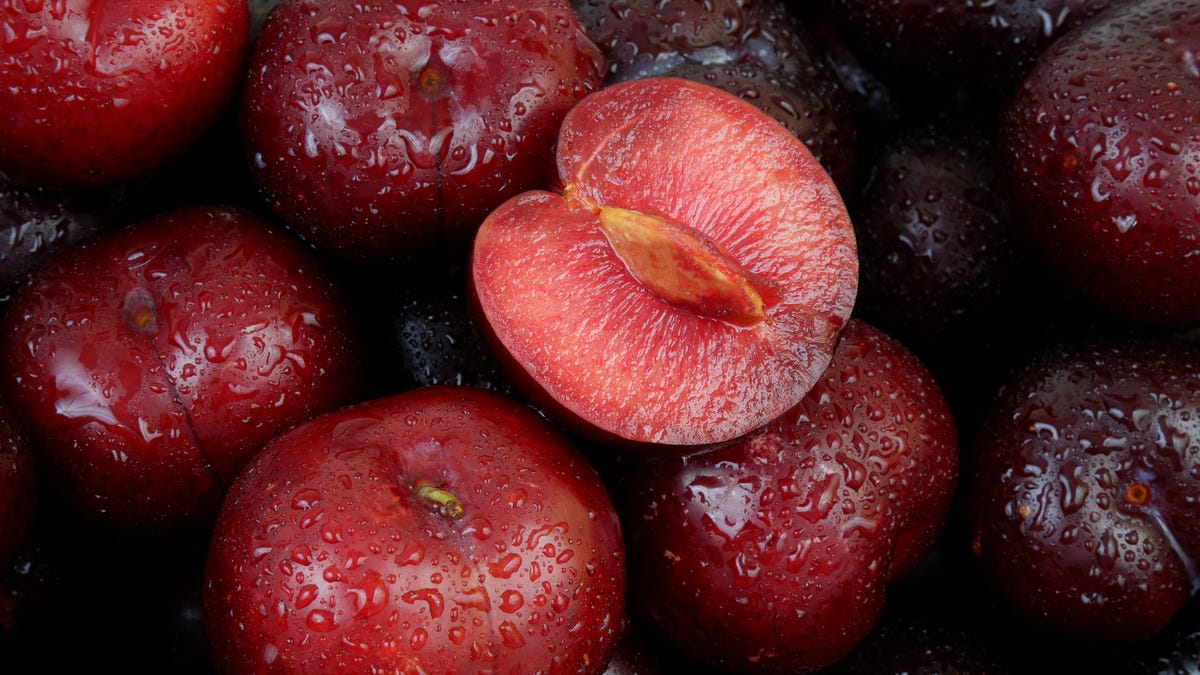
How to add more Vitamin C to your diet and everyday routine
Vitamin C is an essential antioxidant that can do everything from strengthening cells to improving your hair health.
If you ask a group of friends what their favorite fruit is, chances are their responses will reflect the ones most frequently sold in grocery stores. According to the International Fresh Produce Association, the 20 most commonly purchased fruits in the U.S. include bananas, strawberries, apples, grapes, watermelon, cherries and oranges.
Plums are another fruit that make the list — though they come in ninth place and are lumped in with other fruits that belong to the same plant family, namely peaches and nectarines.
Here’s why plums are as nutritionally beneficial as they are juicy and delicious — plus why you may want to go easy on how many you eat each day.
What are plums?
Plums are a kind of stone fruit that belong to the rose (Rosaceae) family. This plant family includes nearly 5,000 species including flowers, trees and shrubs, plus foods like raspberries, pears and almonds.
Within this plant family, “plums are a favorite because they can be enjoyed in so many ways such as fresh, dried, in sauces, baked goods, juices and jams,” says Jen Messer, a nutrition consultant and registered dietitian at Jen Messer Nutrition. “And plums come in countless varieties which can be fun to compare to one another.” More than 300 plum varieties are sold in the U.S. alone, with Santa Rosa, Methley, Stanley and Burbank being among the most popular.
Plums grow on plum trees and vary significantly in size, shape and color depending on where they are cultivated. Chinese and Japanese plum trees, for instance, produce plums with an oblong shape, while European plum trees produce round fruit. Plum trees grow well in a variety of climates, though China, Romania and Serbia remain the world’s top producers of plums, followed by countries like Chile, Turkey, Argentina, Iran, Japan and France. The U.S. produces a lot of the fruit as well, with the vast majority of the country’s plums growing in the fertile orchards of California.
Are plums healthy?
No matter where your favorite plum varieties are grown, they “have an impressive nutrient profile — especially for being a relatively small fruit,” says Messer. Indeed, just two small plums (100 grams), contain protein, calcium, magnesium, phosphorus, potassium, zinc, biotin, vitamin K, vitamin C and more than a gram of dietary fiber, per the U.S. Department of Agriculture.
“Their rich vitamin C content supports immune function and skin health and their vitamin K aids in blood clotting and bone health,” says Alex Larson, a registered dietitian, endurance athlete nutritionist and founder of Alex Larson Nutrition. Larson also praises the potassium content in plums for helping regulate blood pressure; “and they contain polyphenol antioxidants — which support brain health and reduce inflammation,” she adds.
“Plums have also been shown to lower LDL cholesterol — which is the ‘bad’ kind of cholesterol you want lowered,” says Leah Groppo, clinical dietitian with Stanford Health Care. This benefit was most evident in a 2021 study of prunes (dried plums), which demonstrated that consuming just one to two dried pieces of the fruit daily for six months not only decreases bad cholesterol but also increases beneficial HDL cholesterol levels “and reduces inflammatory biomarkers,” says Messer.
The fiber in plums — both soluble and insoluble — also “helps keep digestion on track, balances blood sugar levels and supports heart health,” says Messer. “Maybe less recognized,” she adds, plums can also benefit bone health in some groups of people. “Several studies indicate that prunes can help preserve bone mineral density in postmenopausal women — potentially lowering the risk of osteoporosis,” she explains.
Can you eat plums every day?
Despite so many benefits, plums are probably best enjoyed in moderation. The high-fiber content in plums can lead to digestive issues like bloating, diarrhea and gas. However, that same fiber and natural sugar content such as sorbitol (“which has a laxative effect,” notes Messer), is also why plums and prunes are often thought of as being helpful with constipation. It’s worth noting though that if you eat too many, you may end up worsening the issue. “If you are increasing your prune or plum intake to aid with hard stools, make sure to drink more water as you do so,” advises Groppo.
And because plums belong to such a broad plant family, people who are allergic to peaches, cherries, apricots and some nuts may also be allergic to plums. And because plums contain vitamin K, they can help blood clot — which usually needs to be avoided by anyone taking blood thinners.
As long as such issues are kept in mind, though, plums can be a highly beneficial fruit. “Plums are naturally sweet and nutrient-packed and are a delicious way to add variety, nutrition and color to a balanced diet,” says Larson.
